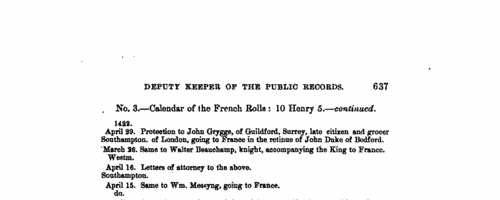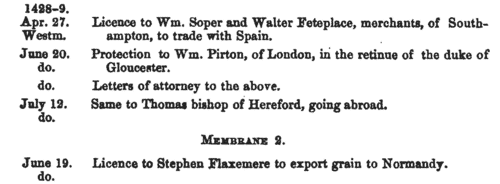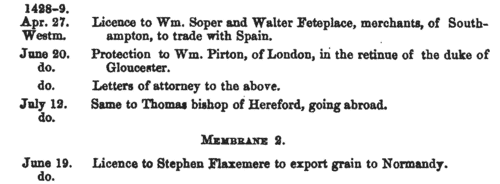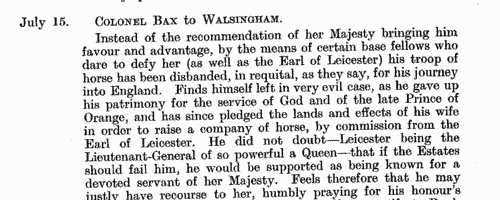Skydmore Surname Ancestry ResultsOur indexes 1000-1999 include entries for the spelling 'skydmore'. In the period you have requested, we have the following 10 records (displaying 1 to 10): Buy all | | | Get all 10 records to view, to save and print for £50.00 |
These sample scans are from the original record. You will get scans of the full pages or articles where the surname you searched for has been found. Your web browser may prevent the sample windows from opening; in this case please change your browser settings to allow pop-up windows from this site. The English in France
(1422)
King Henry V of England claimed the throne of France (and quartered the fleurs-de-lis of France with the lions of England on the royal standard) as had his predecessors since Edward III, as descendants of Philip IV of France. He married Katherine, youngest daughter of king Charles VI of France in 1420, and thereafter styled himself 'heir and regent of France'. The English had real power or influence in Brittany, Normandy, Flanders and Gascony, and actual possession of several coastal garrisons, in particular Calais, where the French inhabitants had been replaced by English. The English administration kept a series of records called the French Rolls. On these are recorded royal appointments and commissions in France; letters of protection and safe-conduct to soldiers, merchants, diplomats and pilgrims travelling to France from England and returning, and to foreign legations. There are also licences to merchants to export to the Continent, and to captains to transport pilgrims. This calendar of the French Roll for the 10th year of the reign of Henry V (from 21 March to his death 31 August 1422) was prepared by Alexander Charles Ewald and published in 1883. SKYDMORE. Cost: £6.00.  | Sample scan, click to enlarge

| Close Rolls
(1429-1435)
The close rolls of the 8th to 13th years of the reign of king Henry VI record the main artery of government administration in England, the orders sent out day by day to individual officers, especially sheriffs of shires: they are an exceptionally rich source for so early a period. There is also some material relating to Wales, Scotland, Ireland and the English possessions in France. Also included is the Exchange Roll of 1424 to 1434, of licences to transmit sums of money out of the realm.SKYDMORE. Cost: £4.00.  | Sample scan, click to enlarge

| The English in France
(1441)
King Henry VI of England (one of the grandsons of Charles VI of France) claimed the throne of France (and quartered the fleurs-de-lis of France with the lions of England on the royal standard) as had his predecessors since Edward III, as descendants of Philip IV of France. The English had real power or influence in Brittany, Normandy, Flanders and Gascony, and actual possession of several coastal garrisons, in particular Calais, where the French inhabitants had been replaced by English. Henry VI came to the throne only seven years after his father had trounced the French at Agincourt; but his cousin, Charles VII, who became king of France in the same year, spent his long reign rebutting the English king's claim to his throne by territorial reconquest and consolidation. The English administration kept a series of records called the French Rolls. On these are recorded royal appointments and commissions in France; letters of protection and safe-conduct to soldiers, merchants, diplomats and pilgrims travelling to France from England and returning, and to foreign legations. There are also licences to merchants to export to the Continent, and to captains to transport pilgrims. As Henry VI's reign progressed, and the English grip on northern France loosened, the French Rolls also increasingly include entries concerning the ransoming of English prisoners.SKYDMORE. Cost: £6.00.  | Sample scan, click to enlarge

| The English in France
(1456)
King Henry VI of England (one of the grandsons of Charles VI of France) claimed the throne of France (and quartered the fleurs-de-lis of France with the lions of England on the royal standard) as had his predecessors since Edward III, as descendants of Philip IV of France. The English had real power or influence in Brittany, Normandy, Flanders and Gascony, and actual possession of several coastal garrisons, in particular Calais, where the French inhabitants had been replaced by English. Henry VI came to the throne only seven years after his father had trounced the French at Agincourt; but his cousin, Charles VII, who became king of France in the same year, spent his long reign rebutting the English king's claim to his throne by territorial reconquest and consolidation. The English administration kept a series of records called the French Rolls. On these are recorded royal appointments and commissions in France; letters of protection and safe-conduct to soldiers, merchants, diplomats and pilgrims travelling to France from England and returning, and to foreign legations. There are also licences to merchants to export to the Continent, and to captains to transport pilgrims. As Henry VI's reign progressed, and the English grip on northern France loosened, the French Rolls also increasingly include entries concerning the ransoming of English prisoners.SKYDMORE. Cost: £6.00.  | Sample scan, click to enlarge

| Clerks and Clergy in Herefordshire, Shropshire and Gloucestershire
(1504-1516)
The register of bishop Richard Mayew of Hereford, containing general diocesan business, but also including ordination lists for monks and clergy. Only a small proportion of the clerks went on to acquire benefices and remained celibate. Hereford diocese covered almost all Herefordshire, southern rural Shropshire, a westward arm of Worcestershire, and a northwestern slice of Gloucestershire.SKYDMORE. Cost: £6.00.  | Sample scan, click to enlarge

| Freemen of London
(1540-1550)
The long series of mediaeval registers and books of admission of the freemen of London was destroyed by fire in 1786. Thirty surviving charred leaves were gathered together and rebound, becoming Egerton MS 2408 in the British Museum. The order is jumbled and generally speaking none can be dated with certainty, although all belong to the very end of the reign of Henry VIII and the start of the reign of his son, Edward VI. These are pages from the admission books. Each entry here usually gives the name of the person admitted to the freedom; his father's name, address and occupation; his entitlement to the freedom, usually by having served out an apprenticeship to a citizen, naming the master and his trade. Then there may follow a cross-reference to M. or N., being two volumes of another set of official books denoted by the letters of the alphabet, and following each other in chronological sequence, which evidently gave details of entries into apprenticeships. These other books no longer exist: but the dates given for entry do identify the start of the apprenticeship, and so give by implication a date for the eventual admission to freedom. In the margin is the name of the city ward and the total of the fee and fine paid on admission.SKYDMORE. Cost: £4.00.  | Sample scan, click to enlarge

| Ambassadors, ministers, soldiers and spies
(1588)
The State Papers Foreign of queen Elizabeth consist mainly of letters and reports concerning England's relations with continental Europe. July to December 1588.SKYDMORE. Cost: £6.00.  | Sample scan, click to enlarge

| Secretary of State's Papers
(1600)
The letters and papers of sir Robert Cecil, Secretary of State, deal with all manner of government business in England, Ireland and abroad.SKYDMORE. Cost: £4.00.  | Sample scan, click to enlarge

| Middlesex Sessions
(1549-1603)
This printed calendar collates a number of surviving records from Middlesex sessions for the period. Principally these are the Gaol Delivery Rolls (G. D. R.) and the General Sessions of the Peace Rolls (G. S. O. P. R.). Both series cover general criminal indictments (bills) together with the recognizances of the witnesses to attend; but the Gaol Delivery Rolls, by their very nature, tend to deal with the more serious cases - felonies where the accused could not be released on bail. The General Sessions rolls also include the sheriff's lists of bailiffs, sub-bailiffs, high and petty constables in the shire; writs of venire facias for production of jurors, writs of capias, lists of jurors, jury-panels &c. The Gaol Delivery Rolls also include coroners' inquests, writs of supersedeas, and memoranda of proclamations. Special inquiries are recorded in separate Sessions of Oyer and Terminer (S. O. T.) rolls and Inquest or Inquisition rolls (I. R.) Although coverage is good, none of the sequences of rolls for this period is complete. A peculiarity of this calendar is that in the case of actual incidents, the date given at the start of each entry is the date that the incident was alleged to have taken place (for instance, 1 June 11 Elizabeth (1569) in the sample scan) rather than the date of the court proceedings. SKYDMORE. Cost: £4.00.  | Sample scan, click to enlarge

| Boys at Eton
(1441-1698)
King Henry VI founded a college at Eton in Buckinghamshire in 1440, 'to the praise, glory and honour of the Crucified, the exaltation of the most glorious Virgin His mother, and the establishing of holy Church His bride'. From this foundation has evolved the modern public school. Sir Wasey Sterry compiled a register for the college from 1441 to 1698, from a variety of surviving records, and including groundwork from his 'A List of Eton Commensals' of 1904, and R. A. Austen-Leigh's 'A List of Eton Collegers' of 1905. This resulting 'Eton College Register' was published in 1943. Because of the variety of underlying materials, the entries vary greatly in depth: some names survive only as a surname of not too certain date. In the fullest entries, the surname (often with a variant spelling) is given first, in bold, followed by the years of entry and leaving. The christian name is given next; then birthplace, and name of father. The initials K. S. (King's Scholar) indicate a scholar on the foundation. There will then follow a summary of the man's career, death, burial and probate; and the sources for the information, in italics, at the end of the entry.SKYDMORE. Cost: £4.00.  | Sample scan, click to enlarge

|
Research your ancestry, family history, genealogy and one-name study by direct access to original records and archives indexed by surname.
|












